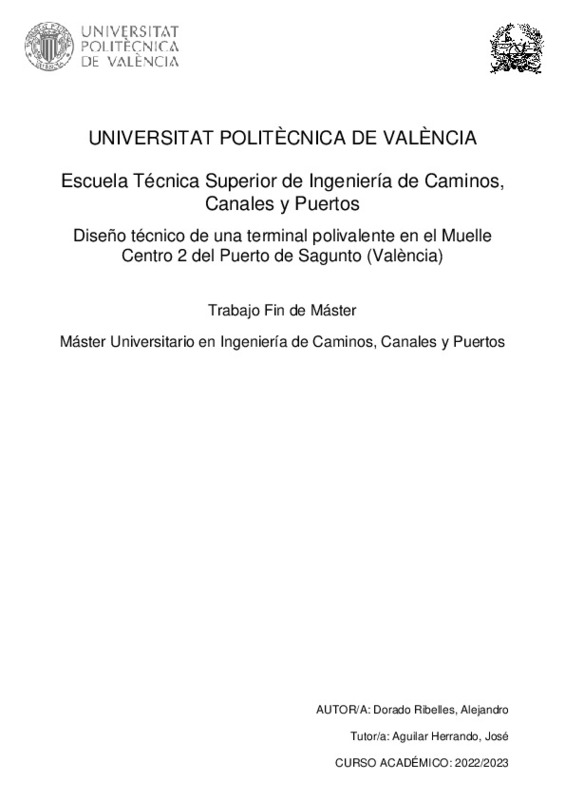|
Resumen:
|
[ES] En la actualidad la creciente competencia entre los distintos puertos hace que se deben integrar de manera cada vez más acelerada propuestas de mejora que hagan que sean más competitivos para no perder cuota de mercado. ...[+]
[ES] En la actualidad la creciente competencia entre los distintos puertos hace que se deben integrar de manera cada vez más acelerada propuestas de mejora que hagan que sean más competitivos para no perder cuota de mercado. Además, temas como la multimodalidad, la automatización, la sostenibilidad o la digitalización se hacen cada vez más importantes a la hora de establecer una nueva terminal. Esto hace que, tanto en fases previas como en el diseño, se deban tener cuenta varios aspectos que antes no se tenían. En concreto, en los puertos industriales no especializados en un solo tipo de mercancía concreta, aunque no se puedan aplicar las mismas reglas por su variabilidad en el tiempo de la distribución de espacios y tipo de mercancías, también se hace necesario garantizar estos aspectos.
El objeto del presente trabajo es dar una propuesta de diseño a la nueva terminal multipropósito en el en el Muelle Centro 2 del Puerto de Sagunto, con el fin de poder captar un mayor tráfico de mercancías, en concreto mercancía contenerizada, fraccionada (break bulk), el transporte especial de grandes proyectos y Ro-Ro. Para ello, se busca dotar de las últimas y más ventajosas características en innovación, sostenibilidad y operatividad desde el punto de vista del diseño de la terminal. La importancia de esto se debe a que en esta fase se plantean grandes retos en diferentes ámbitos a la hora de tomar decisiones que afectaran al buen funcionamiento de la terminal en el futuro. Con ello, se analizan entre otros aspectos: la actual demanda y oferta del mercado, la evolución del tráfico de los puertos industriales, las necesidades de capacidad de los distintos subsistemas de la terminal, las propuestas de diseño en planta y alzado de la línea de atraque en función del buque tipo y su mercancía, los diferentes tipos de grúas y elementos de transferencia en los subsistemas, los distintos tipos de accesos (ferrocarril y carretera) y la capacidad intermodal de la terminal.
[-]
[EN] Nowadays, the growing competition between the different ports means that improvement proposals must be integrated at an increasingly accelerated pace to make them more competitive in order not to lose market share. ...[+]
[EN] Nowadays, the growing competition between the different ports means that improvement proposals must be integrated at an increasingly accelerated pace to make them more competitive in order not to lose market share. In addition, issues such as multimodality, automation, sustainability or digitization are becoming increasingly important when establishing a new terminal. This means that, both in previous phases and in the design, several aspects that were not previously considered must be contemplated. Specifically, in industrial ports that do not specialize in a single type of specific freights, although the same rules cannot be applied due to the variability over time of the distribution of space and type of freights, it is also necessary to guarantee these aspects.
The purpose of this work is to give a design proposal to the new multipurpose terminal in the Muelle Centro 2 of the Port of Sagunto, in order to capture a greater traffic freights, in particular containerized freights, break bulk, special transport of large projects and Ro-Ro. To this end, it seeks to provide the latest and most advantageous features in innovation, sustainability and operability from the point of view of terminal design. The importance of this is due to the fact that in this phase great challenges are posed in different areas when it comes to making decisions that will affect the proper operation of the terminal in the future. With this, the following aspects are analyzed, among others: current market demand and supply, the evolution of industrial port traffic, the capacity needs of the different subsystems of the terminal, the design proposals in plan and elevation of the berthing line depending on the type of ship and its cargo, the different types of cranes and transfer elements in the subsystems, the different types of accesses (rail and road) and the intermodal capacity of the terminal.
[-]
|







